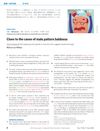 12 citations,
October 2013 in “The Prostate”
12 citations,
October 2013 in “The Prostate” Dutasteride and finasteride affect different cell types differently.
 January 2025 in “Clinical and Translational Medicine”
January 2025 in “Clinical and Translational Medicine” A specific RNA can help hair growth in baldness by boosting stem cell activity.

research Acne
81 citations,
January 2002 in “American journal of clinical dermatology” Hormonal treatments can help with acne, especially in women, by lowering androgen levels or blocking their effects.
 November 2024 in “Stem Cell Research & Therapy”
November 2024 in “Stem Cell Research & Therapy” Stem cells from umbilical cords can help regrow hair in mice with hair loss.
 1 citations,
February 2004 in “Medical Hypotheses”
1 citations,
February 2004 in “Medical Hypotheses” Certain cultural hair practices might cause baldness by affecting natural hair oils and stem cell delivery to hair follicles.
 26 citations,
May 2013 in “Marine Drugs”
26 citations,
May 2013 in “Marine Drugs” Ishige sinicola, a type of seaweed, may help hair grow by blocking a hair loss-related enzyme and boosting important cell growth.
 September 2024 in “Stem Cell Research & Therapy”
September 2024 in “Stem Cell Research & Therapy” HA-stimulated stem cell vesicles improved hair growth in male mice with androgenetic alopecia.
 August 2023 in “Journal of Cosmetic Dermatology”
August 2023 in “Journal of Cosmetic Dermatology” Higher concentration of botulinum toxin A is safe and effective for treating hair loss in men and women.
 7 citations,
January 2017 in “Biological & Pharmaceutical Bulletin”
7 citations,
January 2017 in “Biological & Pharmaceutical Bulletin” Certain compounds from Panax ginseng can block proteins that affect hair growth, potentially helping treat hair loss.
52 citations,
December 2014 in “Journal of Dermatological Science” Apremilast may help treat hair loss in alopecia areata.
11 citations,
November 2009 in “Journal of steroid biochemistry and molecular biology/The Journal of steroid biochemistry and molecular biology” Bolandiol, a synthetic steroid, builds muscle and bone without greatly affecting sex glands, and works differently from other hormones.
 2 citations,
March 2017 in “Canadian Urological Association journal”
2 citations,
March 2017 in “Canadian Urological Association journal” Clomiphene citrate improves fertility in men taking finasteride for hair loss.
 20 citations,
April 2006 in “Dermatologic Clinics”
20 citations,
April 2006 in “Dermatologic Clinics” Antiandrogen therapies are beneficial for treating skin and hair conditions related to androgen levels.
 June 2023 in “Food frontiers”
June 2023 in “Food frontiers” Ginsenoside CK, found in Panax ginseng, can prevent hair loss by controlling certain growth pathways and promoting hair follicle development.
 October 2024 in “International Journal of Ayurveda Research”
October 2024 in “International Journal of Ayurveda Research” Emblica officinalis and Eclipta alba may help treat hair loss naturally.
 1 citations,
January 2022 in “Journal of Biosciences and Medicines”
1 citations,
January 2022 in “Journal of Biosciences and Medicines” Understanding how androgens and their receptors work can lead to improved treatments for skin diseases.
 June 2012 in “Nature digest”
June 2012 in “Nature digest” A substance called prostaglandin D2 is linked to stopping hair growth in men with common baldness.
January 2023 in “Pharmaceutics” AA–TF#15 significantly promotes hair regrowth and could be an effective treatment for androgenic alopecia.
19 citations,
May 2020 in “American journal of men's health” Testosterone therapy helps boys with hormone deficiencies develop normal male characteristics and grow properly.
 38 citations,
July 2012 in “international journal of endocrinology and metabolism”
38 citations,
July 2012 in “international journal of endocrinology and metabolism” Some plant-derived compounds may help with hormonal conditions, but more research is needed to confirm their effectiveness.
 December 2023 in “Annals of phytomedicine”
December 2023 in “Annals of phytomedicine” Dutasteride is more effective than finasteride for hair loss treatment.
 1 citations,
January 2017 in “Asian Journal of Chemistry”
1 citations,
January 2017 in “Asian Journal of Chemistry” New method effectively analyzes finasteride and its stability.
 8 citations,
June 2019 in “Scientific Reports”
8 citations,
June 2019 in “Scientific Reports” Increased PPARGC1α relates to hair thinning in common baldness.
18 citations,
November 2012 in “Current opinion in urology” Finasteride and dutasteride are equally effective and safe for treating benign prostatic hyperplasia.
42 citations,
May 2007 in “Endocrinology and metabolism/American journal of physiology: endocrinology and metabolism” Testosterone can build muscle and bone without enlarging the prostate when a specific enzyme is blocked.
 43 citations,
March 2009 in “Journal of Cellular and Molecular Medicine”
43 citations,
March 2009 in “Journal of Cellular and Molecular Medicine” TGF-β2 plays a key role in human hair growth and development.
 April 2024 in “JCEM case reports”
April 2024 in “JCEM case reports” A man's breast enlargement from low-dose finasteride for hair loss didn't go away, even with treatment, and might be more common than reported.
 2 citations,
November 2012 in “InTech eBooks”
2 citations,
November 2012 in “InTech eBooks” The document concludes that sex hormones are crucial for mammalian reproduction, health, and behavior, and require more research for therapeutic use.
 27 citations,
February 2014 in “Planta Medica”
27 citations,
February 2014 in “Planta Medica” Scutellaria baicalensis extract and baicalin may help prevent hair loss.
 65 citations,
April 2002 in “Journal of Alternative and Complementary Medicine”
65 citations,
April 2002 in “Journal of Alternative and Complementary Medicine” Plant extracts effectively reduce hair loss and increase growth, offering a safe alternative treatment.
























